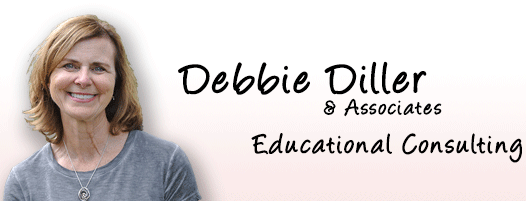|
What We Do
Yes, Debbie or her associates will work with your school(s) in classrooms! Debbie can create a customized plan
that includes modeling and coaching in your building(s) with your students for and with your teachers. We have experience in diverse settings, ranging
from 100% economically disadvantaged schools in inner city and rural settings to private and parochial schools. Debbie’s favorite work is done in classrooms
with teachers and their kids!
To inquire about training Click Here.
Training Topics
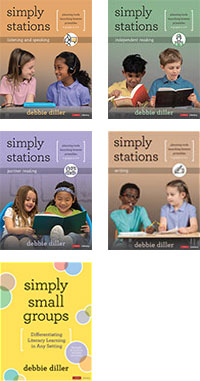 |
Simplifying Stations and Small Group Instruction
Debbie will work with your school or district to create cohorts, small groups that set up and work with literacy stations and small group instruction
throughout the year. This series of ongoing training builds capacity for others to watch and learn from educators on your home turf.
Recommended Books:
(For small group training)- Simply Small Groups by Debbie Diller
(For literacy stations training)- any or all books in the Simply Stations series by Debbie Diller
|
|
|
|
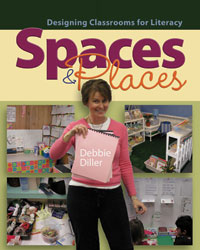 |
Spaces & Places: Using Classrooms More Effectively for Instruction
A well-organized classroom is a more productive classroom! In this training, Debbie or her associates will guide teachers through processes to "declutter"
their classrooms and set up thoughtful, productive spaces for instruction. Using ideas from Debbie's best-selling book, Spaces & Places, we give teachers
strategies and provide inspiration to help them get rid of unnecessary items in their rooms that may be distracting children from learning. Step-by-step
processes for how to set up a classroom to maximize space (and ultimately, time) are included along with many "before and after" examples from K-8 classrooms.
We help teachers look at essential spaces, essential furniture, and making a classroom "student-centered," rather than teacher-centered. Practical ideas
teachers can use immediately are shared. If the training is held in a school setting, we can model the process of how to set up a classroom in the training
using one of the rooms at your school.
Teachers love this training option, especially at the start of the school year or in the summer. Another ideal time for this training is near the end of
the school year when we show teachers how to pack their rooms in one day! If your teachers must move classrooms (due to new construction or rezoning), we
teach them how to pack up their classrooms, too. Interestingly, we have found this training to be valuable (and highly appealing to teachers) at any time
during the school year.
Classroom Makeover Option: Connected to the initial training, a day may be scheduled where we model how to set up several classrooms in your building
and help all teachers work together to declutter and rearrange their classrooms. Search Debbie's blog at
WordPress for examples of some of these makeovers.
Recommended Book: Spaces & Places: Designing Classrooms for Literacy by Debbie Diller
|
|
|
|
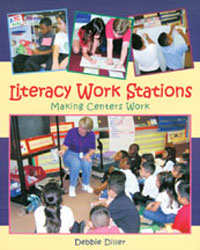 |
Literacy Work Stations: Making Centers Work for K-2 Teachers
Debbie or her associates will present an engaging introduction to literacy work stations and how to make them purposeful and connected to instruction
and state standards. This session will answer the question, “What does the rest of my class do while I’m working with a small reading group?” This
training includes practical suggestions for establishing, managing, and using literacy work stations in K-2.
Follow-up visits may be scheduled after the initial training, usually 1-2 months in between visits. We visit classrooms
and give helpful feedback to teachers on how to continue to improve their work stations. We also meet with grade level teams on these visits to
troubleshoot and plan forward.
Classroom Makeover Option: Debbie or her associates can also use a follow-up day to help teachers set up classrooms to maximize space. Teachers love
these “classroom makeover” sessions. Teachers are involved in hands-on ways as we work together to recreate their space to improve instruction.
Recommended Book: Literacy Work Stations: Making Centers Work (for K-2) by Debbie Diller
|
|
|
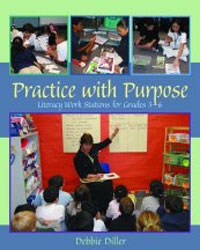 |
Practice with Purpose: Using Literacy Work Stations in Grades 3-6
Debbie or her associates will present an engaging introduction to literacy work stations and how to make them purposeful and connected to instruction
and state standards. This session will answer the question, “What does the rest of my class do while I’m working with a small reading group?” This
training includes practical suggestions for establishing, managing, and using literacy work stations in grades 3-6.
Follow-up visits may be scheduled after the initial training, usually 1-2 months in between visits. We visit classrooms
and give helpful feedback to teachers on how to continue to improve their work stations. We also meet with grade level teams on these visits to troubleshoot
and plan forward.
Classroom Makeover Option: Debbie or her associates can also use a follow-up day to help teachers set up classrooms to maximize space. Teachers love these
“classroom makeover” sessions. Teachers are involved in hands-on ways as we work together to recreate their space to improve instruction.
Recommended Book: Practice with Purpose: Literacy Work Stations for Grades 3-6 by Debbie Diller
|
|
|
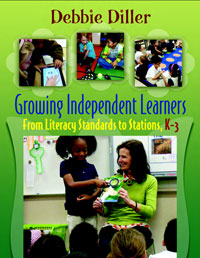 |
Next Steps with Literacy Work Stations: Adding Rigor and Relevance
If your teachers are already teaching with literacy work stations and understand the basics, this training option offers "next steps" and "going deeper
with work stations." You might schedule this option if Debbie or her associates have already worked with you to establish routines for work stations.
This session will help teachers evaluate and reflect upon the independent work their students are doing at literacy work stations and focuses on adding the
elements of rigor and relevance to existing classroom work stations. In this session, trouble-shooting and making connections are the focus. Teachers should
bring curriculum documents and evidence of what students are already doing at stations to this training.
Connected to the initial training, follow-up visits may be scheduled several months later, usually with about 2 months in between visits. We will visit
classrooms and give helpful feedback to teachers on how to continue to deepen and connect their work stations. We may also meet with grade level teams on
these visits to continue to trouble shoot and plan forward.
Recommended Book: Growing Independent Learners: From Literacy Standards to Stations, K-3 by Debbie Diller
|
|
|
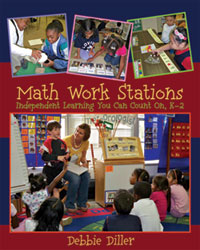 |
Math Work Stations (for K-2 or grades 3-5)
In conjunction with her book, Math Work Stations, Debbie or her associates will help teachers set up and teach with math work stations that connect
to whole group and small group instruction and tie to state and NCTM standards. We include practical suggestions for establishing, managing, and using
math work stations in K-2 or grades 3-5. We also help teachers learn how to organize their math materials so they can use hands-on methods (with all those
manipulatives) more effectively! An emphasis on academic vocabulary and increasing students' "math talk" is included.
Recommended Book: Math Work Stations - Independent Learning You Can Count On, K-2 by Debbie Diller
|
|
|
|
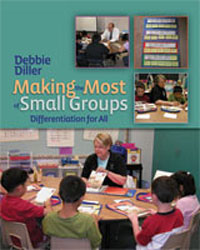 |
Making the Most of Small Group Guided Reading Instruction (for K-2 or for grades 3-6)
Debbie or her associates will share ideas on how to focus small group instruction to help teachers get more power from their lessons. Teachers will learn
how to form groups, organize for instruction, choose books, and plan lessons that will maximize the time spent in small groups. Practical, research-based ideas
are the foundation of these sessions.
Connected to the initial training, follow-up visits may be scheduled several months later, usually with about 2 months in between visits. On the first visit
we meet with grade level teams to model how to plan and teach a small group reading lesson. On subsequent visits, we coach teachers while they work in small groups,
providing helpful feedback and thoughtful questioning to help teachers reflect about their practice.
Recommended Book: Making the Most of Small Groups: Differentiation for All by Debbie Diller
|
|
|
 |
From Phonological Awareness to Phonics and Word Study: Improving Students' Vocabulary, Spelling, and Decoding
In our work across the country, we've found that teachers often ask us about the terms, phonological awareness, phonemic awareness, and/or phonics.
How are these connected? How are they different? In addition, many teachers ask about ways to improve students' vocabulary and how to best provide
vocabulary instruction. So, in response, we've created a new training on word study (phonics, spelling, and vocabulary).
Debbie or her associates will involve teachers in an engaging exploration of word study, examining best practices for teaching phonics (and phonological
and phonemic awareness as prerequisites), spelling, and vocabulary. We will help teachers organize and integrate resources your school/district may be using
in this training, including Words Their Way, Fountas and Pinnell Phonics Kits, etc.
Connected to the initial training, follow-up visits may be scheduled for modeling and/or coaching. Debbie or her associates will model effective lessons
for vocabulary, spelling, and/or phonics in classrooms at your school. These may be whole group or small group lessons.
Recommended Book: Making the Most of Small Groups: Differentiation for All by Debbie Diller
|
|
|
| |
Keynote Topics
Keynotes can be designed for your specific audience.
|
|
|
